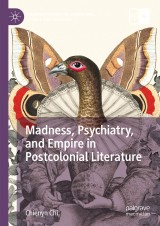Details

Madness, Psychiatry, and Empire in Postcolonial Literature
Palgrave Studies in Literature, Science and Medicine
|
CHF 142.00 |
|
| Verlag: | Palgrave Macmillan |
| Format: | |
| Veröffentl.: | 29.06.2024 |
| ISBN/EAN: | 9783031598920 |
| Sprache: | englisch |
| Anzahl Seiten: | 224 |
Dieses eBook enthält ein Wasserzeichen.
Beschreibungen
<p><em>Madness, Psychiatry, and Empire in Postcolonial Literature</em> provides a comparatist interrogation of empire through archives of history, science, and literature. The book analyzes Aimé Césaire’s <em>Discourse on Colonialism </em>to shed light on Césaire’s critique of psychological and medical discourses of the colonized’s mind. The book argues that the discourse of psychiatry, psychology, and psychoanalysis has erased the context of power in global histories of empire. Through the book’s chapters, Chi analyzes Lu Xun’s “A Madman’s Diary,” Virginia Woolf’s <em>Mrs. Dalloway, </em>and Tsitsi Dangarembga’s <em>Nervous Conditions </em>to assert that the misapprehension of madness should not automatically be accepted as the history of an isolated Western culture but rather that of the history of imperialism—a globalizing process that silences alternative cultural conceptions of the mind, of madness, and of behavior, as well as different interpretations of madness.</p>
<p>1 Aimé Césaire’s Insensé Réveil.- 2 Lu Xun’s 狂.- 3 Virginia Woolf’s Tangled Forest.- 4 Conclusion Tsitsi Dangerembga’s Muroyi.</p>
<p><strong>Chienyn Chi</strong> received her PhD in Comparative Literature from the University of Texas at Austin, USA, and is working on her second book, <em>The Colony and The City</em>.</p>
<p><em>Madness, Psychiatry, and Empire in Postcolonial Literature</em> provides a comparatist interrogation of empire through archives of history, science, and literature. The book analyzes Aimé Césaire’s <em>Discourse on Colonialism </em>to shed light on Césaire’s critique of psychological and medical discourses of the colonized’s mind. The book argues that the discourse of psychiatry, psychology, and psychoanalysis has erased the context of power in global histories of empire. Through the book’s chapters, Chi analyzes Lu Xun’s “A Madman’s Diary,” Virginia Woolf’s <em>Mrs. Dalloway, </em>and Tsitsi Dangarembga’s <em>Nervous Conditions </em>to assert that the misapprehension of madness should not automatically be accepted as the history of an isolated Western culture but rather that of the history of imperialism—a globalizing process that silences alternative cultural conceptions of the mind, of madness, and of behavior, as well as different interpretations of madness.</p>
<p><strong>Chienyn Chi</strong> received her PhD in Comparative Literature from the University of Texas at Austin, USA, and is working on her second book, <em>The Colony and The City</em>.</p>
<p><strong>Chienyn Chi</strong> received her PhD in Comparative Literature from the University of Texas at Austin, USA, and is working on her second book, <em>The Colony and The City</em>.</p>
Intervenes in Foucauldian, Freudian, and Felmannian thought Bridges the divide between World and Postcolonial literature Takes a comparatist reading of British, African, and Asian studies
<p>“In her intrepid and original study, Madness, Psychiatry, and Empire in Postcolonial Literature, Chi offers major interventions in postcolonial theory, comparative modernism, and medical humanities. For the first time, Chi traces a critique of psychoanalysis and the pathologization of the colonized person’s mind from Aimé Césaire’s Discourse on Colonialism to Lu Xun’s “A Madman’s Dairy,” Virginia Woolf’s Mrs. Dalloway, and Tsitsi Dangarembga's novel Nervous Conditions. In a study that spans the 20th century and the world, Chi provides a groundwork for a global critique of how madness has been used to exclude and silence otherness. In the guise of a discourse of health and care, what Chi calls “Empire(icism)” eschews objectivity and instead enables and obscures imperial trauma. Proposing the reading method of “crossings,” which brings together texts from across the globe and in different fields, Chi shows that to be fully decolonializing, the study of empires must “cross.” Geographically and discursively, the investigation of Modernism and its aftermaths must “not stay in its lane,” since empires themselves create material networks of connection. Chi’s work complements the current discussion of the history of psychiatry, but it goes further. She suggests that psychiatry itself is part of liberal discourse that certain writers interrupt through expressive explorations of the psychiatrist’s relationship to the madman, the soldier, the colonized woman of color, and other actors across empire. With exquisite close attention to texts like Woolf’s “Being Ill,” Chi resurfaces the ways in which her archive of madness critiques, satirizes, and resists empires. There is an unruliness to madness, and to Chi’s hermeneutics of “crossing,” which troubles toxic notions of imperial sanity. Ultimately Chi’s project reveals the persistence of these logics into 21st century, which is far from postcolonial or postimperial, and what yet remains to be “crossed.”</p>
<p>-Elizabeth Richmond-Garza, Columbia University</p>
<p>-Elizabeth Richmond-Garza, Columbia University</p>
Diese Produkte könnten Sie auch interessieren:

The Enigma of Good and Evil: The Moral Sentiment in Literature
von: Anna-Teresa Tymieniecka
Preis: CHF 354.00
-
-
© 2024 media control GmbH
Alle Preise enthalten die gesetzliche Mehrwertsteuer. - AGB
- Impressum
- Datenschutzerklärung
- Kontakt
- FAQ
- Mein Konto
- Home
- Erweiterte Suche
- Widerrufsrecht
- Reader-Software
- Desktop-Ansicht
- Gutschein-Code einlösen

